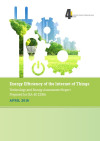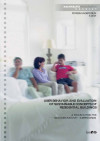Suchergebnisse
SynENERGY - Energy optimised settlement development by making use of synergies of energy efficiency, spatial planning and building culture
SynENERGY aims at an innovative, holistic approach to urban district optimization. The project targets a comprehensive analysis of the framework and urban development concept which includes not only optimisation of sustainable energy supply and use but also increased material flows (construction and disposal) at urban district level.
Gründerzeit with future - subproject 4: Development of a real estate portfolio management tool for real estate trustees and owners
Development of a portfolio management tool for the administration of real estate technical data and to support the decision-finding process related to renovation of "Gründerzeit" buildings. The management tool will be applied in practice, in the demonstration projects implemented within the flagship project "Innovative Modernisation of Wilhelminian style "Gründerzeit" Buildings". The results will be available in the form of check-lists and guidelines applicable in the decision-finding process related to renovation measures.
aspern Vienna´s Urban Lakeside - subproject 1: Public Space and Micro Climate: Basics for climate sensitive planning in Aspern
The Project will derive planning examples and recommendations in order to optimize the building performance as well as outdoor amenity. The study will be based on a climate prognosis of the aspern area and compare different reference examples of construction and open space design.
Sani60ies - Demonstration of minimally invasive thermal and energetic refurbishment of classic 1950s and 1960s apartment buildings
System development of a façade-integrated building component activation for "warm" refurbishments with high transfer potential to buildings of classic apartment complexes from the 1950s and 1960s. The system is being tested and further developed based on three building projects and demonstrated through broad application (over 200 flats).
Workshop: Greenhouse Gas Aspects of Biomass Cascading - Reuse, Recycling and Energy Generation, Old Finglas Road, Glasnevin
25. Apr 2005
Enterprise Ireland Campus - Conference Theatre (main building)Dublin, IE
The reduction of greenhouse gas emissions is an urgent international target. It will provide a forum for government, policy and academic representatives to exchange information on current knowledge regarding optimal use of biomass for greenhouse gas mitigation.
Renew Building - Competence Building and Knowledge Transfer for Climate-friendly renovation with ecological and renewable materials
The project Renew Building provided knowledge about eco-friendly renovation to the target groups (planners, architects, students of architecture, etc.) through theory and practice classes, lectures, an e-learning platform, and in an online knowledge database.
Development of the first legally compliant verification procedure for plus-energy buildings by a complete revision of the ÖNORMS
Within the project the current Austrian standards concerning building services and building physics have been revised and further developed to provide the designers with standardized calculation algorithms for the design of plus-energy buildings.
IDsolutions - Solutions for the refurbishment within existing building stock with interior insulation
The refurbishment of existing building stock demands solutions within single units. Interior insulation is a suitable technology. The challenge is to bring multiple demands and requirements together to create optimal solutions. Therefore it's necessary to arrange individual system components to form working model refurbishment solutions. The development of such solutions is the aim of the project. Not only durability and quality is to be ensured, but also user acceptance. Increasing the rate of refurbishments is the overall aim of the project.
Development of affordable building equipment and services for future "Energy Plus houses" (Plus-Hybrid)
"Plus-Hybrid" integrates knowledge and experience from current activities and complement them by adopting a holistic approach, considering the intelligent interconnection of components as well as managing the planned efforts and human resources in time. The goal of this project was to develop affordable building equipment and services for future "Energy Plus houses".
Energy Efficiency of the Internet of Things - Technology and Energy Assessment Report (2016)

Herausgeber: IEA - 4E EDNA
Englisch, 66 Seiten
Downloads zur Publikation
High-quality refurbishment - Designing quality standards for the refurbishment of municipal buildings

Designing quality standards for ecological refurbishment (based on E. Panzhauser's proposals, 2001); applying them to characteristic types of buildings systematically selected in diverse municipalities; the achieved results shall serve as good practice examples for future refurbishment and as basis of discussion on subsidy regulations.
Demonstration project senior-housing concepts for new construction and renewal in Vienna, Menzelgasse

Acompagning the process of realisation and settlement of two projects of senior-housing (new construction and renewal), documentation and general assumptions.
Intelligent and green? User centred scenarios for information technology use in sustainable buildings

The project asked for the contribution of information technology use to the environmental performance of buildings - in terms of the vision of designers, practical use in existing projects and expectations of potential users.
IEA SHC, Task Solar Thermal Plants with Advance Thermal Storage Technologies for Low Energy Buildings

Participation in TASK 32 "Storage concepts for solar buildings". Subtask leader of the subtask for heat storage based on phase change materials
User Behavior And Evaluation Of Sustainable Concepts Of Residentia Buildings

A Focus within the "HAUS DER ZUKUNFT" Subprogram
Forschungsforum
4/2001
Herausgeber: BMVIT
Englisch, 6 Seiten
Downloads zur Publikation
VR4UrbanDev - Virtual Reality as an innovative, digital tool for the integrative urban development of the future
Virtual reality (VR) has the potential to make complex issues more quickly comprehensible and directly tangible. In the VR4UrbanDev project, we are using this potential for energy planning processes for buildings and urban districts. On the basis of test areas, we develop methods for importing and visualising energy-related real-time data and simulation data in the VR environment.
Phytozid - Application of tansy extract and its ingredients as insecticides against the codling moth
Extraction of insecticidal active substances in pilot plant scale from tansy for field trials against the economically important pest codling moth (Cydia pomonella) as well as approval procedure in order to develop alternative strategies for naturally based plant protection.
Workshop: CFD aided design and other design tools for industrial biomass combustion plants
6. June 2013
Bella Center, room 19
Copenhagen, DK
IEA Bioenergy Task 32 organises an expert workshop on Computational Fluid Dynamics (CFD) aided design as a side event of the EU Biomass Conference to share practical experiences and address the current opportunities and limitations of CFD based design of industrial biomass combustion appliances
"eco fashion - fashion for the future" - Congress about ecological and social impacts of textile production
The project was intended to promote a change of image related to ecotextiles. A congress provided teachers and education experts with background information and tools for their work, thus leading to a sustainable transfer of knowledge in education.
AR-HES-B – Energy storage, production and recovery of valuable substances in wastewater treatment plants
AR-HES-B develops technologically based concepts of municipal wastewater treatment plants in order to convert them from energy consumers into a hybrid energy provider, energy storage and a provider of resources. The concept enables wastewater plants to turn into an important platform in the regional energy and mass transfer.
